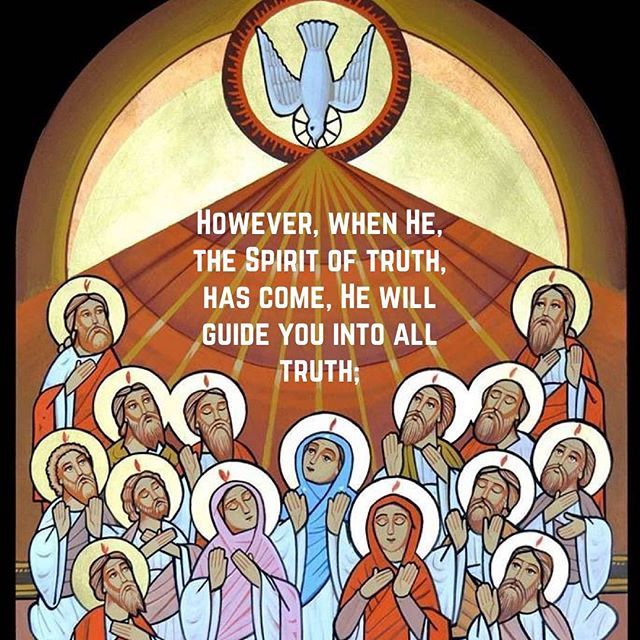
The Holy Spirit in the Church of the Apostles
The Spirit of God was essential to them for they could not work without Him. The Holy Spirit worked with them in preaching and teaching. They waited according to the Lord’s command. Their previous preparation for service which lasted more than three years did not dispense them of the Holy Spirit and His work in and with them. Perhaps these ten days which they waited were days of prayer and hope, from the heart, in preparation for the coming work.
How did the Holy Spirit descend?
- The Holy Spirit descended upon them in the shape of tongues of fire. The result was that, “they were all filled with the Holy Spirit” (Acts 2:4). They spoke the tongues of all the nations gathered on that great day (people from about 15 nations), speaking about the glories of God (Acts 2:9-11). Peter spoke and the result was that the audience were cut to the heart, accepted the words with joy; three thousand were baptized on that day (Acts 2:37,41).
- Thereafter, they granted the Holy Spirit by the laying on of hands, just as had occurred to the people of Samaria; the Bible says that the apostles sent Peter and John to them, “who when they had come down prayed for them that they might receive the Holy Spirit…Then they laid hands on them, and they received the Holy Spirit” (Acts 8:15,17). Likewise with the people of Ephesus, as the book of the Acts of the Apostles states, “And when Paul had laid hands on them, the Holy Spirit came upon them, and they spoke with tongues and prophesied” (Acts 19:6).
- The Holy Spirit was then granted by the Holy Anointment. This is because there was no opportunity for the laying on of hands by the apostles after the spread of Christianity in many countries. Therefore, Christianity usd what is now known as the Holy Myron (Chrism). Saint John the Apostle alluded to this anointment by saying, “But you have an anointing from the Holy One…: (1 John 2:20) and, “But the anointing which you have received from Him abides in you…” (1 John 2:27) (Also see 2 Corinthians 1:21).
- As for the priesthood, the apostles received this through the Holy Breath. The Lord Jesus Christ breathed on them, “…and said to them, Receive the Holy Spirit. If you forgive the sins of any, they are forgiven them; if you retain the sins of any, they are retained” (John 20:22,23).
Thus, the Holy Spirit who was in them forgave or retained sins through them. The apostles then granted the Holy Spirit through the sacrament of priesthood by the laying on of hands. Here we remember the saying of Saint Paul the Apostle to his disciple Timothy, the bishop of Ephesus, “Therefore I remind you to stir up the gift of God which is in you through the laying on of my hands” (2 Timothy 1:6). He also said to him regarding the ordination of others, “Do not lay hands on anyone hastily nor share in other people’s sins” (1 Timothy 5:22).
We can also see in the sending of Barnabas and Saul that, “…having fasted and prayed, and laid hands on them, they sent them away. So, being sent out by the Holy Spirit, they went down to Seleucia…” (Acts 13:3,4). Therefore, by the laying on of hands they were sent by the Holy Spirit. Likewise in the ordination of the seven deacons, “whom they set before the apostles; and when they had prayed, they laid hands on them” (Acts 6:6).
In this way we can see that the laying on of hands was accompanied by certain prayers, which are presently the rites of ordination. We can also see that the Holy Spirit descended upon the disciples from God directly, as there is none higher than them to whom He may grant the Holy Spirit. They became, “…stewards of the mysteries of God” (1 Corinthians 4:1). They became stewards of God who then granted the Holy Spirit with the laying on of their hands and their prayers, as in the ordination of bishops, priests and deacons. Or by the laying on of hands initially and then by anointing as with granting the Spirit to the believers in general. In this way the Spirit who is in them is transferred to others in the way that we mentioned.
At present we practice the Sacrament of the Holy Myron (Chrism) or the Sacrament of Anointing, after Baptism. During the rites of this sacrament, we anoint the child with the Myron (Chrism) on many parts of his body, and we also lay the hand on his head and breathe in his face saying to him, “accept the Holy Spirit…”. With respect to ladies, the bishop can lay his hand on the woman’s head with prayers to accept the Holy Spirit and anoints the visible parts of her body such as her head and hands.








